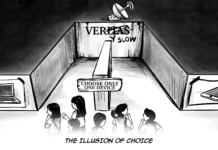After typhoons “Rolly,” “Quinta” and “Ulysses” ravaged Luzon, leaving some parts of Metro Manila, Rizal and Cagayan submerged in roof-level floods, it brought a sense of déjà vu to some of us who had experienced the “Ondoy” disaster in 2009. Eleven years have passed since “Ondoy,” and here we are, still facing typhoons whose deadly power has been intensified by climate change.
Climate change is defined by the Merriam-Webster Dictionary as a “significant and long-lasting change in the Earth’s climate and weather patterns” which is usually associated with global warming. Pope Francis in his second encyclical Laudato Si, in which he laments the environment’s degradation, describes climate change as a “global problem” with grave environmental, economic and socio-political effects.
The most affected by this global problem are developing countries such as the Philippines, which is visited by some 20 typhoons annually.
As these typhoons rampage through the country, the same things happen over and over. Filipinos move into congested evacuation centers, wait for heavy rains and strong winds to subside and wait in hope with ample prayers. “Filipino resiliency,” indeed.
As Taylor Swift said in her song “Exile,” “I think I’ve seen this film before, and I didn’t like the ending.”
Climate change may be inevitable but human activities greatly contribute to its worsening.
According to the National Disaster Risk Reduction and Management Council’s Dec. 10 situation report, “Ulysses” caused more than P7 billion in agricultural damage and almost P13 billion in infrastructure damage. It affected more than 1.2 million families, left 101 people dead and injured 85 others.
Even Cagayan Gov. Manuel Mamba admitted after the onslaught of “Ulysses” that the flooding brought by the typhoon was a summation of the wrongs done to the environment. He said forest denudation in the Cordilleras and the Sierra Madre, unauthorized mining and riverbed siltation aggravated the flooding in Cagayan.
In 2019, Robert Watson, chair of the Intergovernmental Platform on Biodiversity and Ecosystem Services, said in a United Nations forum that the “destruction of biodiversity and ecosystem services has had reached levels that threaten our well-being at least as much as human-induced climate change.”
The widespread removal of trees causes soil to hold less water and causes disturbances in the water cycle, leading to abnormal changes in the climate.
Some would say the depletion of natural resources and the scrapping of the earth’s surfaces for “quality-of-life” upgrades are part of global development, but doing so without plans for rehabilitation is no different than looting.
Yes, progress and development are essential but not at the expense of other species; they should not be treated as mere consumable resources. God may have given us the gift of intellect and free will but we must never forget that we are His stewards tasked to safeguard and nurture His creation. Quoting Laudato Si: “Never have we so hurt and mistreated our common home as we have in the last two hundred years. Yet we are called to be instruments of God our Father, so that our planet might be what he desired when he created it and correspond with His plan for peace, beauty and fullness.”
Pope Paul VI in his apostolic letter Octogesima Adveniens in which he called for the involvement of all human beings in solving issues on justice and peace, noted that despite the Church’s support of society’s “effort” to cope up with the demand of human needs, being responsible stewards of God’s creation is as important as the goods we produce and consume. It also urged the development of moral consciousness to check the capitalist ideology of progress just for the sake of progress.
Illegal mining and illegal logging were seen as the primary sources of flooding and landslides in the Cagayan and Isabela provinces during “Ulysses.” How many more typhoons does our country need to suffer the wrath of before we realize and acknowledge that the destruction they cause stem from our abuses?
It is the time to be accountable, to establish firm policies in ensuring the protection of our ecosystem, and to listen to experts for sustainable and inclusive solutions. Again, quoting Laudato Si: “The problem is that we still lack the culture needed to confront this crisis. We lack leadership capable of striking out on new paths and meeting the needs of the present with concern for all and without prejudice towards coming generations. The establishment of a legal framework which can set clear boundaries and ensure the protection of ecosystems has become indispensable; otherwise, the new power structures based on the techno-economic paradigm may overwhelm not only our politics but also freedom and justice.”














